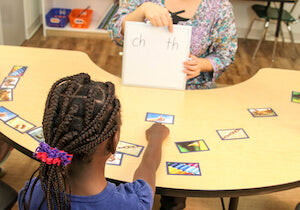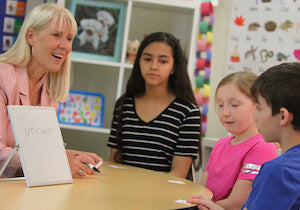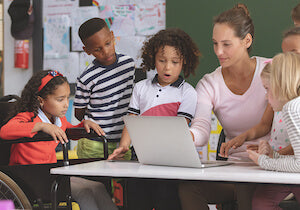Professional Learning
From Pioneer Valley Books
Professional Learning: Focused Workshops
Focused Workshops provide professional learning opportunities designed to dig deeper into a specific reading topic. These segments are intended for those who are already familiar with Literacy Footprints or differentiated reading instruction.

1. Exploring Word Study: Digging Deeper into Emergent, Early, and Transitional Word Study (Target Audience: K–2 Teachers)
Word study is the component of the guided reading lessons that allows teachers the opportunity to provide explicit instruction for phonics and word-solving skills. By teaching a short word study activity during the guided reading lesson, teachers can prompt students who need more support in learning a skill and teach them how to transfer that newly learned skill to reading and writing. In this workshop, teachers will learn and practice word study procedures that support Emergent and Early readers in developing strong decoding and encoding skills. Half-day session.

2. Exploring Word Study: Digging Deeper into Transitional and Fluent Word Study (Target Audience: 3–5/6 Teachers)
Word study is the component of the guided reading lessons that allows teachers the opportunity to provide explicit instruction for phonics and word-solving skills. By teaching a short word study activity during the guided reading lesson, teachers can prompt students who need more support in learning a skill and teach them how to transfer that newly learned skill to reading and writing. In this workshop, teachers will learn and practice word study procedures that support Transitional and Fluent readers in developing strong decoding and encoding skills and vocabulary. Half-day session.

3. Making Intentional Instructional Decisions: Responsive Teaching (Target Audience: K–2 and 3–5/6 Teachers)
The Literacy Footprints Guided Reading lesson frameworks have three integral parts: guided reading, word study, and guided writing. The lesson parts were developed by aligning target skills, strategies, and comprehension focuses with the literacy continuum. The most effective guided reading lessons are planned and delivered by responding to student assessment data. In this workshop, participants will engage with student assessment data and lesson frameworks to modify the lessons and prompting in response to students’ needs in order to ultimately accelerate learning. Half-day session.

4. Moving Forward with Comprehension: Digging Deeper into the Comprehension Focus (Target Audience: 3–5/6 Teachers)
Each Literacy Footprints Guided Reading lesson has a comprehension focus that threads through the lesson framework. In Chapter 7 of Jan Richardson’s The Next Step Forward in Guided Reading, 12 comprehension focuses are introduced across 29 teaching modules. In this workshop, participants will take part in a mini-book study while exploring each comprehension focus through the Literacy Footprints lessons. They will learn how to use the progressive steps to differentiate the support provided to students during guided reading lessons. They will leave with a strong understanding of how to lead students toward internalizing the comprehension focus to reach the goal of constructing meaning while reading any given text. Half-day session.

5. Guided Writing: Writing with Intention and Intensity (Target Audience: K–2 and 3–5/6 Teachers)
The Literacy Footprints lesson framework includes a guided writing lesson. Guided writing provides an opportunity to support students as they write about the book they’ve just read, which in turn increases their comprehension. In this workshop, participants will learn how to analyze students’ writing to address their needs according to target skills. Participants will learn how to provide prompting and assistance during guided writing, including how to give appropriate scaffolding that helps students develop writing skills and craft. Half-day session.

6. Building Strategic Readers: The Art of Prompting for Strategic Action (Target Audience: K–2 and 3–5/6 Teachers)
A key element of guided reading involves close observation of students’ literacy processing behaviors. Learning how to listen and make quick decisions about where to prompt takes time and practice. In this workshop, participants look carefully at what strategic actions are important for students to develop at each reading stage. Additionally, they will learn the importance of using running records as a tool for observing how students are approaching reading. Finally, the participants will delve deeper into how to foster strategic processing as students read and reread a new book, as well as how and what to teach the group following the reading. Half-day session.

7. Using the Digital Reader: The Nuts and Bolts (Target Audience: K–2 and 3–5/6 Teachers)
The Digital Reader provides students with the opportunity to engage with over a thousand fiction, nonfiction, and decodable books that can be accessed both in the classroom and at home. This workshop includes the nuts and bolts of how to design your digital classroom, form groups, assign books, create student bookshelves, use and track student data, and so much more! Participants will leave the session all set up and ready to begin using the Digital Reader with their students. Half-day session.

8. Using the Digital Reader: Digging Deeper to Enhance Independent Learning (Target Audience: K–2 and 3–5/6 Teachers)
The Digital Reader provides a unique opportunity to engage students in meaningful literacy learning. In this session, teachers will explore ways to utilize the Digital Reader to enhance independent activities. Participants will explore the Digital Reader content and collaborate with others to develop purposeful and engaging literacy stations. Half-day session.


